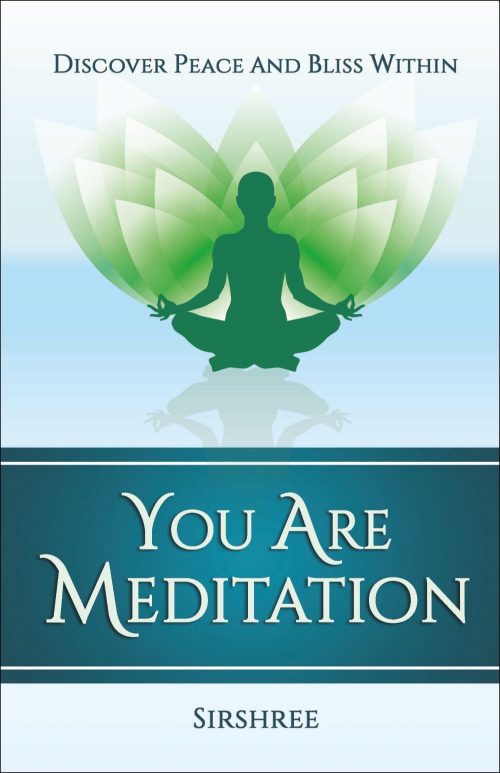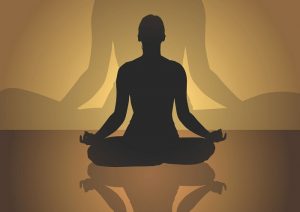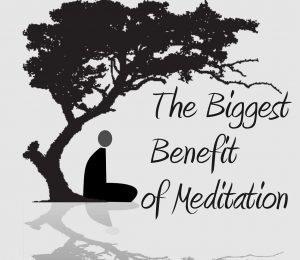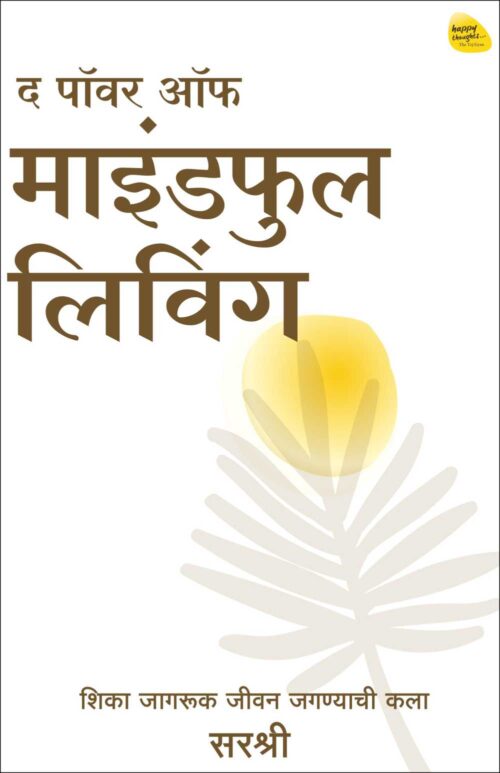There are several benefits of meditation such as emotional intelligence, creativity and productivity, happiness, empathy and compassion. Also, it has a great impact on health. Research has linked meditation to reduced negative inflammatory activity, increased positive antiviral response, improved function of specific strains of immune cells, and higher antibody production.
Besides these benefits, there are several spiritual benefits too. Let us look at a few benefits of meditation, that are not often talked about. All these seven benefits have one common thread – inner growth!
- Meditation develops detached enthusiasm.
The practice of meditation develops an approach of detached enthusiasm within us. It encourages us to enthusiastically perform actions without being attached to their results. We also become detached from any expectation of knowing what the result of our actions may be.
Many people become trapped by the expectation of receiving rewards for their actions. Even while rendering selfless service, they may initially serve well but when their actions bear fruit they wish to claim the credit. To avoid such preoccupations, we should be enthusiastic in our action, but detached from the fruits of our action. By practicing meditation, we gain the power to achieve this balance.
Now think about all your activities from morning to night, and contemplate “How will my life be if I perform every action with detached enthusiasm? How will I get up in the morning? How will I eat food? How will I conduct my work? How will I offer someone help?†With detachment, you are no longer concerned by trivial matters such as not receiving thanks for a compliment, or an acknowledgment for providing help. Such concerns will no longer bother you. Thus, you will remain detached from the fruit of your actions. With faith in nature that whatever is yours will come to you, and nothing can stop this, you can live your daily life with a feeling of ease and acceptance. -  Meditation helps to witness emotions.
Generally, when we sense negative or uncomfortable feelings, we try to escape them by indulging in distractions. These might be listening to music, watching TV, eating out, browsing shopping, or simply venting our anger on somebody. If we choose food as our distraction, our bad feelings may subside but our weight increases. Many people who develop obesity are really suffering from emotional stress. Of course, it’s not just obese people who have difficulty managing their feelings. For most people, there are only two ways of dealing with negative emotions: either suppress them within, or express them by shouting aloud and abusing other people. Shouting at others serves the ego, but it does not remove the emotional stress. We still suffer the turmoil of our inner emotions.
But there is a third way of handling such emotions. With the practice of meditation, we learn to witness emotions as they arise in our body. This way, we neither keep emotions within ourselves nor vent them out on others. We just observe them, as if they are not part of us and take the required action calmly. They have simply arisen in the body–mind mechanism that we use. This approach is a significant paradigm shift.
For example, imagine you are cutting a thick cloth with scissors and you hear the scissors complain: “This cloth is so thick… It’s so hard to cut… Why make the cloth so difficult?â€You would laugh at the scissor, wouldn’t you? Here we are clear that these are the feelings of the tools we are using are not our own. In the same way, we can observe emotions arising in our own body from the perspective of a detached witness. Believing ourselves to be the body–mind mechanism we identify with all that affects it. But as a detached witness we can tell ourselves, “These emotions are not in me (the real ‘I’). They arise in the tool that I use, i.e., the body–mind mechanism. The real ‘I’, or Consciousness, is the knower of this mechanism. It can witness these emotions and know they are just temporary.â€
Meditation helps us to observe these emotions from our original state of being. Just like the weather changes over time, we can watch our emotions change with time too. From morning to night, our emotions undergo change. Whenever our mood changes, or we recall old memories, we give an opportunity for emotions such as grief, despair, or anguish to arise. Both our inherited genes and our upbringing are a stimulus for this. With consistent observation, our entire stock of inwardly suppressed and troubling emotions can disappear. We can realize that we are not the body and that it is only an instrument for our use. Once we recognize that we are not the body, then we are no longer affected by its emotional distress. Thus, through the practice of meditation, we can free ourselves from all such sufferings. - Meditation teaches the art of being in the present.
With the practice of meditation, we learn the art of being in the present. When we are in the present, we are aware only of our breathing, our listening and speaking, our eyes perceiving, and perhaps our hands at some work. We do not think of anything else. In meditation, not only are we aware of everything happening in the present, but we are at the same time also aware of our sense of beingness, our sense of presence.
Being is central to the Source. Beingness is the experience of existence, the “is-ness†of life. It is that feeling of being awake and alive, within and from which everything is ultimately manifested. This experience of ‘presence’ or ‘aliveness’ is constantly happening within every human being.
The present has immense power because the mind has no role to play in it. The mind plays a role only while being in the past or future. It gets worried about the past or anxious about the future. As soon as we are in the present, the mind surrenders and only silence prevails.
This does not mean that you do not learn from the past or not prepare for the future. If we wish to learn a valuable lesson from the past, we can quickly visit our past – just as the comic character Superman speeds around the earth in a flash. Without getting stuck in the past, we can immediately then return to the present. If we need to plan, or contemplate on something for the future, we can quickly visit the future just as the comic character Spiderman does. Spiderman throws his web to the exact place where he wants to go. We, also, can decide exactly where we want to go in the future and as soon as the purpose is served, we can immediately return to the present. - Meditation raises the level of awareness.
If you turn on your television in the morning and open all windows and curtains, what will happen? Will you be able to see the television screen clearly? No, the screen will appear pale and the colors weak and faded. Does this mean there is a problem with the television set? No, because the same television screen will look perfectly clear at night. This means that although the screen remains the same, its clarity depends on external factors.
After practicing meditation, some people claim they can experience clearly a sense of presence. Others may say that the experience is not so clear. The important point is that the experience of the Source never changes, it is only our level of awareness that changes. Awareness levels will always fluctuate, particularly if we don’t contemplate and meditate regularly. But people who consistently meditate and contemplate deeply are able to maintain high levels of awareness. This should encourage us to continue with the practice of meditation and contemplation. - Meditation helps reveal our faults in the light of the sense of being.
It’s normal human tendency to venture into the imaginary world. We make up many stories to engage our mind in imagined thoughts. But while making up such stories, we are usually unconscious of how this thought process actually works. With the practice of meditation, our level of awareness increases. We begin to open up and understand the hidden alleys of our mind, secrets of which we were unaware begin unraveling.
In meditation, we are able to question our thoughts. We ask: “What’s going on inside me? Which thoughts keep arising within me? Which stories am I inventing now?†We can witness the negative thoughts we may be carrying against others, such as “This person rejects my importance… He does not respect me… He is being unfair.†At this point, we guide our mind to stop and ponder on these thoughts. We firmly tell the mind, “You are unaware of the complete picture and are focused on just a narrow picture. Come out of this imaginary world and stop inventing tales.†With this, the mind gradually becomes quieter. Our tangled thoughts begin to untangle. We restore the perspective of our innate untroubled nature, and we become happy. - Meditation offers the bliss of silence.
By practicing meditation, we begin to experience the bliss of silence. Initially, we may not understand how we can be happy in silence. We may feel that silence only produces boredom. But the bliss of silence is reached by forbearing through the phase of boredom and then transcending it. The true bliss experienced in silence is not like the joy derived from worldly pleasures. It is beyond both worldly joy and sorrow.
However, to reach the state of blissful silence we need the proper attitude to meditation. If we meditate with expectation of a blissful experience, our active mind will be constantly checking whether it’s experiencing bliss. This constant checking prevents us from going deeper into meditation. However, if we quietly meditate, without expectations or checking our state, gradually we enter the deep experience of Source. We then realize we can sit in that blissful state of silence for hours. When we begin observing everything from that state, we understand that no feeling or thought can touch us. We witness everything arising from silence and dissolving into it – just like the waves in an ocean. This is possible with consistent practice of meditation. We should learn to close our eyes for some time in meditation in order to keep them open for the rest of the day. - Meditation brings awareness of “Who am I?†– Our original state of being.
Due to ignorance, we are caught in our own web of misconceptions and false patterns of thought. This leads to a sorrowful and unconscious life. The only way out is to awaken ourselves from this slumber. When we awaken from this unconscious state and realize our true nature, it’s an eureka effect.
The most important question of spirituality is “Who am I?†When we delve deeper into meditation, we know its answer through our own experience.
When we repeatedly ask “Who am I?†this thought becomes superior to any other thought. Thus, if something frightens us we ask, “Who is frightened?†The answer quickly comes “I am.†But when we ask further “Who am I?â€, we can know that our true Self is independent of fear. Placing such constant self-enquiry before every thought, we realize we are no longer bothered by worry, sorrow, or pain. Through meditations such as self-enquiry, we become aware of our sense of being, our essential nature, and who we truly are.
Summary:
Along with the several benefits of meditation like emotional intelligence, creativity, productivity, happiness, empathy, compassion and good health, there are several spiritual benefits as well. Seven of the spiritual benefits listed in this article help in inner growth.



















Add comment